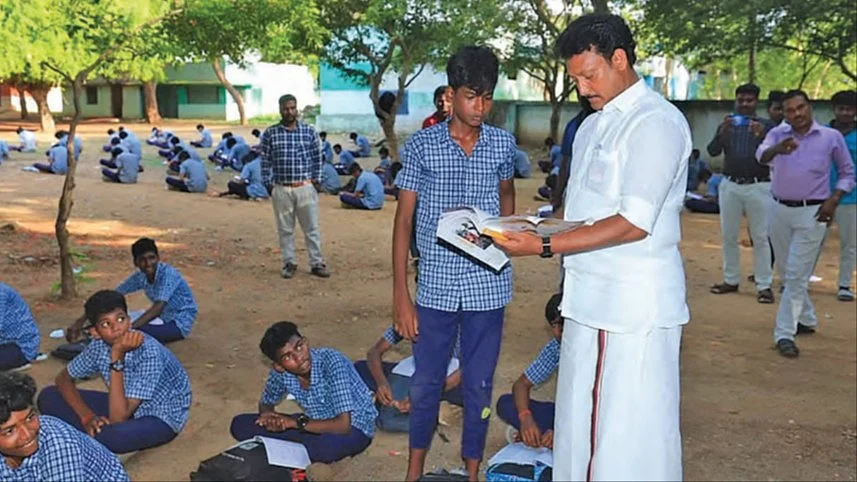Nation
Tamil Nadu says NOPE to the NEP
The three-language formula is unacceptable and there’s no two ways about it

Accept the New Education Policy (NEP)—or else. That was the open threat that led Tamil Nadu chief minister M.K. Stalin to issue the pungent charge of ‘blackmail’.
Addressing the Kashi Tamil Sangamam in Varanasi, Union Education Minister Dharmender Pradhan declared that Tamil Nadu would not receive funds under the Samagra Shiksha Abhiyan (SSA) if it didn’t implement the NEP and its three-language formula.
Outraged, all the INDIA bloc parties came together to demand the Centre withdraw its threat, with thousands gathering in Chennai on Tuesday, 18 February.
The Centre already owes Tamil Nadu Rs 2,152 crore under the SSA. Nearly 40 lakh students and 32,000 teachers are affected by the money being held up.
It has anyway been a longstanding grouse of the southern states that the tax revenues they contribute are allocated disproportionately, year after year, to laggard northern states like Uttar Pradesh and Bihar.
UP chief minister Yogi Adityanath’s brag about the state government spending Rs 7,500 crore for the Maha Kumbh Mela—with the Union government said to have pitched in with an equal amount—has only rubbed it in. If UP has so much money, why starve the southern states of essential funds?
The protests were spearheaded by the ruling DMK, which has been locked in a dispute with the Centre over the NEP (introduced in 2020). The state also opposes the draft UGC (University Grants Commission) rules that seek to dilute the power of states in regulating universities.
Deputy chief minister Udayanidhi Stalin categorically stated that Tamil Nadu would not surrender its rights and warned of another ‘language war’ if withheld funds are not released by the Centre.
Senior DMK ministers including education minister Anbil Mahesh and MP T.R. Baal were present at the demonstration, along with alliance leaders from the MDMK [Vaiko], CPI, CPM and others. Leader after leader emphasised that the state would erupt in anger unless the funds were granted.
Rajya Sabha MP from Tamil Nadu and senior Congress leader P. Chidambaram said Pradhan’s arrogance revealed his ignorance of Tamil history and sentiment. ‘Formulating the state government’s language policy is the right of the state’s people and it is the right of the state government. Does he know that only one-language policy is followed in Hindi-speaking states?’ he wrote in a social media post. How was it okay, chimed TN’s transport minister S.S. Sivasankar, that students in Hindi-speaking states only learnt one language, and non-Hindi speaking states were to be forced to learn three?
Chief minister Stalin, accusing the BJP of ‘coercion’ and ‘intimidation,’ said this was just the latest in a long list of provocations—the stepmotherly treatment of the state in the Union Budget, the continued obstructionism and hostility of Governor R.N. Ravi, and now the imposition of Hindi through the three-language policy. While the Constitution was amended to put education (originally a state subject) on the concurrent list, the chief minister wanted to know which article of the Constitution mandates a three-language policy.
***
The NEP’s three-language formula—whereby students learn two regional languages, including the state language, and English—does not explicitly mention Hindi, but Tamil Nadu believes this is a way to thrust Hindi down the state’s throat.
Anti-Hindi sentiment has a long history here, going back to the 1930s, when the Justice Party launched violent demonstrations in 1937-38 against the attempt to introduce Hindi in secondary schools by C. Rajagopalachari, the Premier of Madras Province.
In his biography, The Rajaji Story his grandson Rajmohan Gandhi explains that the idea was to introduce Hindi to students of classes 6 and 7, with the stipulation that failure to pass would not block promotion. Rajaji preferred the term ‘Hindustani’—to convey that Urdu words would also be included and the language could be learnt in either the Devanagari or the Arabic script.
E.V. Ramasamy Naicker, or Periyar as he is better known, the rationalist leader who fought against Brahminism, was at the forefront of the anti-Hindi agitation. The demonstrations took a violent turn after two arrested students died in police custody. Rajaji was not swayed by public protests and refused to relent. However, in 1939, Rajaji resigned and Madras Governor Lord Erskine withdrew the order a year later.
The issue was vigorously debated in the Constituent Assembly, following which Hindi was adopted as the official language with English as an associate language for a period of 15 years till 26 January 1965. (Jawaharlal Nehru brought in the Official Languages Act of 1963 to allow the continuation of English as an associate language.) Many non-Hindi states opposed the imposition of Hindi, but it was in Tamil Nadu that it manifested itself in full force.
In 1963, the DMK launched its ‘direct action’ demonstrations against Hindi. Party founder C.N. Annadurai’s arrests (in ’63 and ‘65) and the immolation of two youth members of the DMK on 27 January 1965 sparked off a series of violent incidents. Police fired on riotous crowds leading to casualties, and in one horrific incident, a police sub-inspector was burned alive by a mob.
It was only when Prime Minister Lal Bahadur Shastri assured protesters that English would continue to be used as an associate official language indefinitely that the situation calmed down. The DMK capitalised on the anti-Hindi agitation to come to power in the 1967 elections, heralding a continuing era of Dravidian party rule in the state.
One of the first acts of the new DMK government headed by Annadurai was to promulgate a two-language formula—Tamil and English—which continues to this day.
Might the Union education minister consider educating himself on the historical context that explains why Tamil Nadu finds the Centre’s insistence on the three-language policy so hard to swallow?
Published: undefined
Follow us on: Facebook, Twitter, Google News, Instagram
Join our official telegram channel (@nationalherald) and stay updated with the latest headlines
Published: undefined